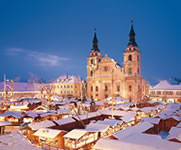Let the music play on
The Grassi Museum complex is named after Franz Dominic Grassi, a banker and merchant who donated the money for its construction in 1929. However, the history of the Leipzig collection dates back to the Dutch music publisher, Paul de Wit. He opened a museum in 1886 in which he exhibited historical musical instruments that he occasionally played, as visitors are invited to do today in the museum's sound laboratory. On a tour of the current collection, visitors can take a journey through the development of the musical instrument from the Renaissance through to the present day.



